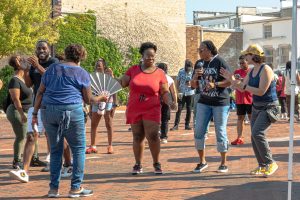Genesis House residents accomplish much at NIU
November 29, 1990
We’re all different. Some of us are athletic; some of us can write poetry; some can do other things. We all have our unique abilities.
However, some of us have unique disabilites. Some are mentally handicapped. Some live at Genesis House.
Genesis House, located in Genoa, Ill.,is an intermidiate care facility for 94 developmentally disabled adults.
“Essentially, it’s a nursing home,” said Jack King, sociology professor and university liaison to the GH project. “For the most part, people who live there don’t have the ability to prepare their own meals or take their won medication. None are bedridden,” he said.
Some residents have a moderate ability to care for themselves; others don’t. Genesis House is staffed 24 hours a day and medical care is provided, but there is a small degree of supervision, King said.
GH is funded by the department of public aid, and being state-funded, it must meet some requirements. Residents are required to spend five hours a day, five days a week partaking in activity.
King said that each individual has his own program and his progress is monitored. Each person has his own individual goals. From time to time, the state will check the residents’ progress and also check that each individual’s needs are being met.
Of the 94 GH residents, 27 visist campus Monday through Friday.
“I think it’s been great because it’s rewarding to watch the residents on campus,” said King. “It’s been interesting to see the change come over them.”
King aslo said the program is a different experience for them because NIU is a totally different environment.”They’re not surrounded by people like them. Most of the residents have spent their whole lives in an institution. They can do things here they were never able to do,” he said.
The residents work in groups, King explained. Some participate in art therapy and a regular recreation program at the OCR, King said. “The people at the rec have been great,” he said. Some participate in open swimming, or bowl at the Huskie Den. One group sits in on King’s Sociology 101 class.
King is an impetus behind the program that began bringing residents to campus.
King first got involved with the GH program about two years ago when he was supervising an internship program. He sent GH some interns, he said. However, the owners of Genesis House were looking for a place to give the residents social skills training. Using the university “sounded interesting to do,” King said. He contacted the provost’s office and got approval. Ever since the summer of 1989, GH residnets have been attending the NIU campus.
Some of the people working with Genesis Hosue residents are NIU students. Kristen Swanson, special education major, is one of those students.
As a training counselor, Swanson takes the residents around to their classes and activites. “You’re constantly busy during the day, bringing them to and from classes.
“I’m not (directly) teaching them, but in a way I am. They’ve been institutionalized all their life. By doing this on a day-to-day basis, they’re learning social skills,” she said.
Swanson, who has been working with the residents for one year, said NIU is the first experience with a classroom setting the residents have had. “It’s unbelievable the difference in what these people have accomplished. Last year, in social skills, they were far behind. They’ve come a long way in terms of interacting with people and in terms of academic skills,” she said.
She also mentioned the progress they have made in creative art. Recently, many residents have made face masks in art therapy, which were on display and for sale at an art show at the OCR. “Last year, they wouldn’t even put their fingers in clay; now they do. It’s so great to watch them do this,” she said.
Swanson said at first she thought taking on the job of a counselor “would be a good experience, but I have really grown. For every resident I have to say I really love them so much. They’re fantastic.”
However, the job is not without its down side. “I see a lot of frustration,” she said, “and a disappointing aspect is how intolelerant people are of them. We’re in a middle stage; we’re on our way to being accepted, but we’re not really there.”
Swanson said that when she and the residnets visit the Huskie den, they have to enter through a back door. “It doesn’t apply to different races; it shouldn’t apply to different mental capacities,” she said.
Not only is she involved with the residents on campus, but Swanson also helped initiate a non-scholastic activity for the residents with Sigma Chi fraternity.
Todd Peterson, Sigma Chi public relations officer, said he and Swanson are good friends, and she told him about her work with the residents. They thought it would be a good idea for the fraternity to get involved.
In October, Sigma Chi held a picnic for the residents who visit campus. Traditional picnic foods like hot dogs and hamburgers were served, and then games were played.
It began to rain after they ate lunch, Peterson said, so the games were moved inside. Games like Bozo buckets were played, and they played music and danced, he said.
Peterson said the main reason for sponsoring the picnic was becasue “hardly anyone (in the fraternity) is educated on handicapped peopole. We did it to ecucate ourselves.
“The picnic went over really well. The guys want to do it again in the spring,” he said. Each resident received a Sigma Chi T-shirt at the picinic,and the residents presented the fraternity wirh a large “Thank You” card.
Sigma Chi also held a fundraiser to purchase backpacks for the residents.
“We had such a great time, we’re going to do this annually,” Peterson said. “We’ll do it again this year, but we’re not sure when.”
Another person who enjoyus working with the GH residents is Sandy Reading, an art therapist who conducts creative art classes at the OCR.
“I love working with them; it’s great,” she said. “I’ve seen them grow a lot and I love it. They’re really neat people.
“They’re uninhibited and really creative. The best part is to see their self-esteem build through anything they do. They see that they can accomplish something.”
And accomplish they do. King said that one resident, a man about age 40, recently secured a job folding towels for three hours a week at the OCR. “It’s the first time in his life he’s ever had a paycheck,” King said.
It was the same man, King said, who spoke to King’s sociology class about what it was like growing up in a mental institution.






